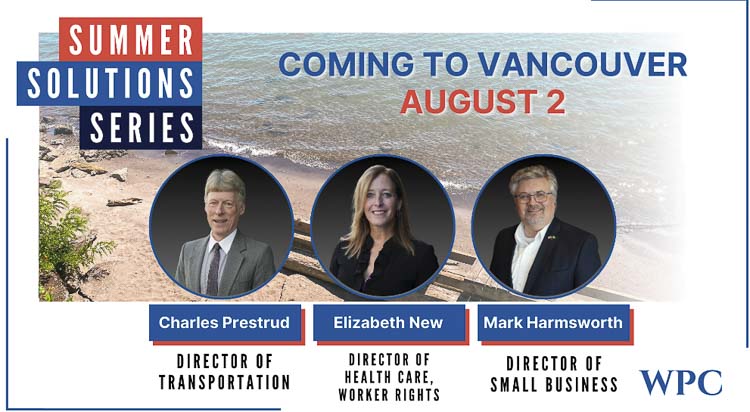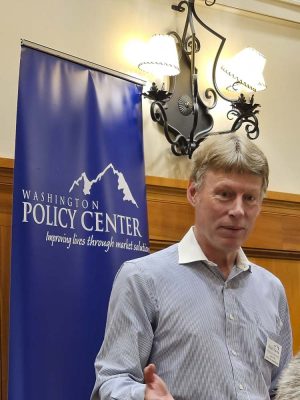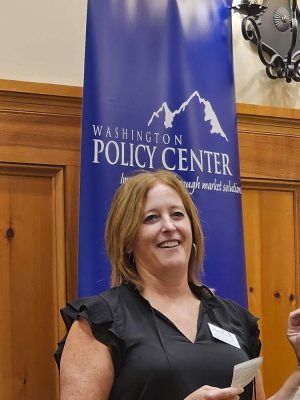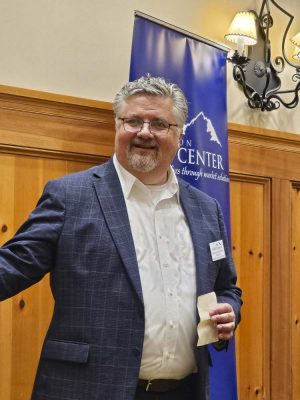Interstate Bridge, Long Term Care, and Small Business discussed at Vancouver event
John Ley
For Clark County Today
The Washington Policy Center (WPC) brought three policy experts to Vancouver last week (Aug. 3). Joining them was Dan Cole, chief operating officer of the nonprofit. The organization has been providing Washington citizens with state policy analysis for 27 years. They have subject matter experts in the following eight areas: agriculture, education, environment, government reform, health care, small business, transportation and worker rights.
Charles Prestrud spoke about the Interstate 5 Bridge replacement project and transportation. Elizabeth New addressed health care and worker issues, including WA Cares. (Initiative 2124 would make WA Cares optional instead of mandatory.) Mark Harmsworth spoke about housing affordability issues and small business regulation.
The event was part of a series of meetings the organization is holding around the state. Policy experts share information and answer questions regarding issues of concern to each community.

IBR and transportation
Of primary interest to local citizens was Pretrud’s presentation on transportation. He noted that the COVID-19 pandemic lockdowns only accelerated a trend in declining transit ridership. The opportunity for people to work from home had fewer people using transit or driving. Now that the pandemic is behind us, people driving privately owned vehicles have returned to normal but transit ridership is well below pre-pandemic levels.
The Interstate Bridge Replacement (IBR) program is behind schedule. Prestrud noted the delay in issuing a Draft Environmental Impact Statement is not only adding to people’s concerns, but also the costs of the program.
Prestrud indicated what is needed is additional transportation capacity across the Columbia River. He also wondered about the Locally Preferred Alternative of the IBR. “Preferred by whom?” he asked, as there is a lot of citizen pushback on both sides of the river.

He referenced the TriMet Orange Line construction roughly a dozen years ago. It has failed to attract new ridership on MAX light rail. He noted costs have gone up substantially while ridership has declined. Light rail operating costs at TriMet have tripled on a per-passenger basis.
The Portland area population has grown substantially, but transit ridership has been declining instead of growing. Prestrud wondered if there would be the political will to change the LPA. He noted that the growing price of the project should cause sticker shock, potentially forcing changes to the project.
One citizen noted the real problem is the two-lane choke point at the Rose Quarter. That caused another person to shout “death to Moda Center,” as traffic congestion continues to get worse. Portland refuses to add new through lanes to I-5 at the Rose Quarter as well as on the Interstate Bridge project.
WA Cares Fund
Elizabeth New, a Vancouver resident, shared information and perspective on the state’s Long-Term Services and Support Trust, or the WA Cares Fund. She also noted that many of the politicians in Olympia are pushing for universal, government-run health care. That would likely result in people waiting to get access to health care.
In discussing WA Cares, she mentioned I-2124, which would amend the state’s program for long-term care. She noted the citizen initiative would not end the program, but would make it voluntary and unlikely be able to pay its way. Because the program has multiple problems as designed, New hopes the legislature will simply repeal the act next year if I-2124 passes.
Citizens are currently paying a payroll tax of 58 cents per $100 of earnings. The tax’s sole purpose is to fund the program. To get the benefit, a person must pay in for 10 years without a break of five or more years. The maximum benefit is $36,500, which is inadequate for funding most people’s long-term care.

New noted there were two primary purposes for the legislation, passed in 2019. First was a new source of money for the Legislature, which would then help offset the state’s Medicaid costs. The second was creating more taxpayer-funded caregiving jobs.
She noted that roughly 500,000 people opted out of the program, given a limited opportunity to leave the program if they obtained private long-term-care insurance. Private sector insurance companies offered similar products, many with richer benefits.
In response to a question about the Janus decision allowing public workers to disassociate from a union, New said it should be as easy to quit a union as it is to join a union. She also wants government employers to stop collecting union dues, preferring the unions bill their members directly.
She advocated for Medicaid reform to address long-term care issues. It was noted that our safety net (Medicaid) is already being abused.
Small business
Mark Harmsworth spoke about the housing affordability problems and overregulation of small businesses. He is a former state legislator and small business owner. He mentioned that he spends thousands of dollars each year in various business licenses, all of which gets passed on to customers.
The latest Seattle increase in the minimum wage to $20.29 in January 2025 will continue to drive small businesses out of the city. Most people are aware of businesses fleeing downtown Seattle for a host of reasons, primarily related to homelessness and crime; but also the unfriendly business environment.
Andy’s Fish House is at odds with the city of Snohomish over its COVID-era outdoor seating area, which the city says requires a permit now. Harmsworth noted that outdoor seating was allowed during the pandemic lockdowns in order for them to remain open.

Now the city is threatening to essentially shut them down for continuing to use the facility it had previously approved. They would have to lay off 75 percent of their employees if the city doesn’t back off.
Harmsworth also mentioned the housing affordability crisis. One of Seattle’s proposed solutions is to consider rent control. What is needed is changing the Growth Management Act to allow for expanding the Urban Growth Boundary to let the private sector build more housing.
The current attempt to ban natural gas will also negatively impact housing, if people are forced to modify existing homes. Harmsworth fully supports I-2066 to reverse the ban on natural gas and let people exercise choice in their fuel supply for heating homes, cooking and businesses.
Harmsworth shared that he is currently building a new house in a rural part of Kittitas County. He was required to get four separate permits to simply expand an existing well. The cost was about $4,000. He mentioned needing a full-time bookkeeper to keep track of all the various “destination sales taxes” he is required to pay, based on the location of his business clients.
Cole closed out the gathering, making a pitch for the Washington Policy Center’s annual dinners on Sept. 20 in Spokane and Oct. 25 in Bellevue.
Also read:
- Vancouver mayor pro tem acknowledges the mayor ‘set the trap’ for Michelle BelkotAudio reveals Vancouver mayor pro tem described mayor’s plan to provoke Belkot at C-TRAN meeting, sparking removal and lawsuits.
- Opinion: An unacceptable tax burdenNancy Churchill outlines new tax proposals in Washington state, warning of growing burdens on working families amid budget shortfalls and government overspending.
- Expect delays on eastbound SR 14 West Camas Slough Bridge for annual inspection, SaturdayAnnual inspection will close the eastbound lane of SR 14 in Camas.
- Vancouver Police investigate shootingVancouver Police investigate a carnival shooting involving youth and a firearm.
- POLL: Is it time for new leadership at Vancouver City Hall?A new weekly poll asks whether Vancouver voters should prioritize replacing the mayor and city council in the 2025 election.
- Opinion: How will the majority party’s new budget and tax proposals affect you?Rep. John Ley critiques the state’s proposed 2025-27 budgets, warning of record-breaking tax hikes and economic impacts.
- Opinion: Washington’s EV sales far short of next year’s state mandateTodd Myers highlights how Washington’s EV sales fall short of next year’s mandate, raising concerns over rising car prices and limited options.











